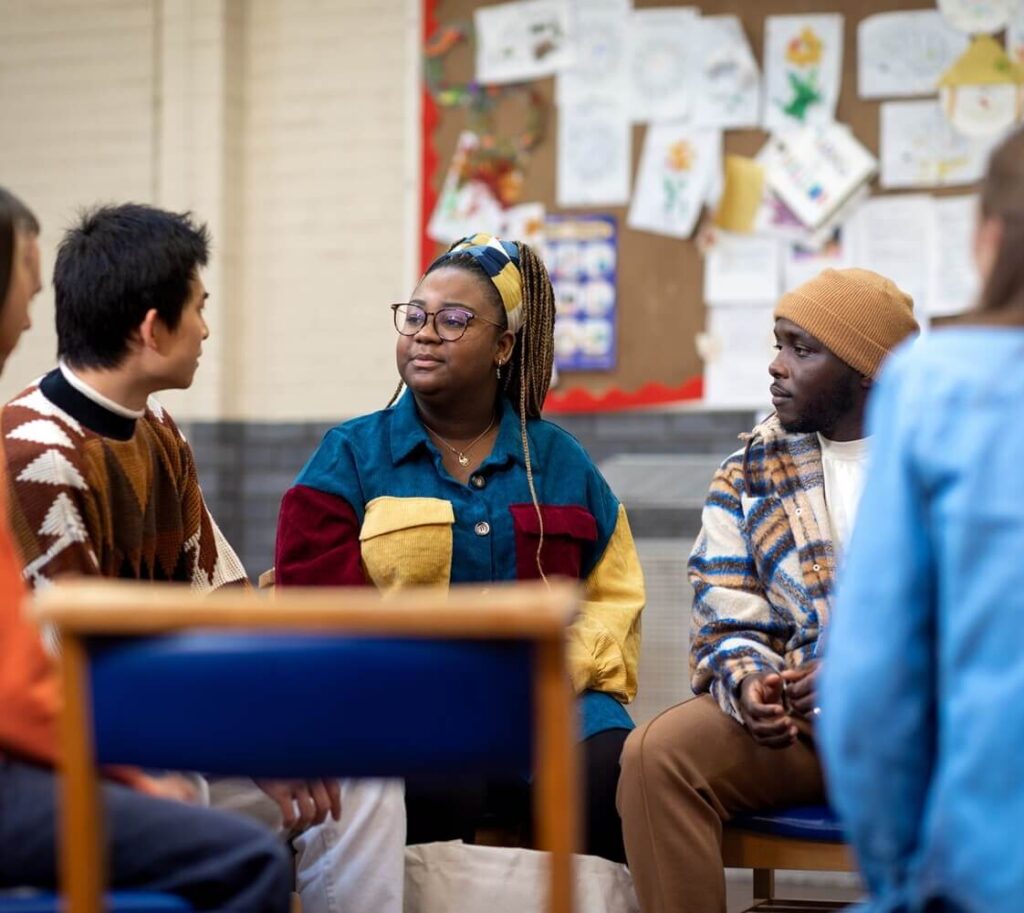Family relationships with adult relatives – parents, siblings, adult children, in-laws – can be deeply meaningful, but if they become difficult it can be hard to know what to do to put them right, particularly if other family members become involved. Many people feel stuck between wanting peace and fearing confrontation, especially when support options are limited.
Unfortunately, services like family mediation are often not easily accessible and are rarely free. This can leave people who are struggling with family conflict feeling isolated, unheard, and overwhelmed. Our helpline FamilyLine, often only hears from people once they’ve reached crisis point, whereas early support might have been able to prevent things from getting worse.
For that reason, we’ve put together this guide to offer practical steps to help you navigate the challenges of family issues, whether you’re trying to repair a relationship or come to terms with estrangement.
Why family relationships can be so difficult
Family dynamics are often shaped by years of shared history, expectations, and emotions. Conflicts can arise from a variety of factors, including unresolved childhood experiences, differing values, caregiving responsibilities, and generational divides.
Depending on how long these tensions have been going on for, this can lead to burnout, guilt, and the painful feeling that you’re the only one trying to make things better. We can also lose sight of the fact that we can’t control the behaviour of others – only how we respond to it. And communication is not only a very powerful element of family relationships – it can also be one of the hardest to get right.

The power of communication – when it’s possible
When approached with care, communication can make a big difference in how well you understand each other and the possibilities for change in the future. Yet fear of rejection, escalation, or being misunderstood can hold people back.
Here are some suggestions for communicating with your relatives in the most effective way possible:
Understand your goal
Before starting a difficult conversation, take a moment to get clear on what you’re hoping to achieve. Are you trying to feel heard? Set a boundary? Start to rebuild trust?
Knowing your goal helps you stay focused and prevents the conversation from getting diverted into unrelated issues. It also helps you measure whether the conversation was productive, even if it didn’t resolve everything.
Try writing it down first
If speaking feels overwhelming or emotionally charged, writing a letter or message can be a gentler way to express yourself.
This method allows you to organise your thoughts, avoid interruptions, and communicate clearly. It also gives the other person time to absorb what you’ve said and understand how it makes them feel, without the pressure of having to give an immediate response.
Regulate before you communicate
Difficult conversations can trigger strong emotions. Taking time to regulate yourself – for example through deep breathing, a walk, or journalling – can help you approach the situation calmly.
When you’re emotionally grounded, you’re more likely to speak thoughtfully and fully listen to the other person, which increases the chances of a constructive outcome.
Use ‘I’ statements
Using ‘I’ statements helps you express your feelings without sounding accusatory or placing blame. This approach shifts the focus from what you feel the other person did wrong to how their actions affected you.
For example, instead of saying “You never listen to me,” try “I feel dismissed when I’m interrupted.” This subtle shift can reduce defensiveness and create space for a more open conversation.

Practice active listening
Active listening means being fully present and showing that you’re genuinely trying to understand the other person’s perspective. It involves asking clarifying questions and reflecting back what you hear.
For example:
- “It sounds like you’re feeling really overwhelmed by everything that’s happened.”
- “I hear that you felt left out when we made that decision without you.”
- “So what I’m hearing is you’re not angry, but you’re hurt?”
- “Can you help me understand more about why that upset you?”
- “I didn’t realise that’s how it came across – thank you for telling me.”
These responses show empathy and encourage the other person to keep sharing, even if you don’t agree with everything they say.
Be open to compromise
Compromise doesn’t mean giving up your values – it means finding a middle ground where both people feel respected. Look for small areas of agreement or shared goals. Even small gestures of flexibility can help rebuild trust and show that you’re invested in the relationship.
Challenge with compassion
If someone’s behaviour is harmful, it’s okay to address it, but how you do it will impact the response you get. Framing your concerns with compassion can reduce defensiveness and increase the likelihood of change.
For example, you might say: “I know you don’t mean to hurt me, but when you say X, it really affects me.” This approach acknowledges the person’s intentions while still holding them accountable.
Acknowledge generational differences
Depending on their experiences when they were growing up, older relatives may be less familiar or comfortable with emotional language, boundary-setting, or discussing mental health. They might dismiss your concerns or resist change – you might hear: “Well, we just have to get on with it,” or feel they’re just ignoring situations you would rather talk about.
This brisk and apparently detached approach isn’t malicious, but due to the unfamiliarity of having open and honest conversations about emotions and mental health. Like many unfamiliar things, it can take some getting used to in order to feel comfortable. Recognising this can help you approach these conversations with patience and avoid taking their reactions personally.
Know when to pause
Not every conversation needs to be resolved in one sitting. If things get heated or too emotionally draining, it’s okay to take a break. Pausing allows both parties to reflect and return to the conversation with a clearer head and a calmer heart.

Navigating family events and loyalty conflicts
Sometimes, one person continues to tolerate toxic behaviour out of love, while other relatives refuse to engage. If you’ve ever heard someone say something like: “If they’re going to be at the event, I’m not going,” you’ll know exactly what we mean. This can create conflicts of loyalty and emotional strain, when family members feel torn between two relatives.
Many families avoid challenging harmful behaviour because they feel it would just cause an argument, but it doesn’t have to be confrontational. Avoiding these difficult conversations can actually deepen divides over time. So don’t wait for a crisis – address behaviour early, with kindness. And even if you are dealing with a long-standing situation, it’s not too late to take some positive steps. Go back to the communication tips above to do this as effectively as possible.
Coming to terms with estrangement
Estrangement can feel almost like grief and can be incredibly hard to come to terms with. Whether you’re estranged from a parent, sibling, or adult child, the emotional impact can be profound.
To help you heal over time, consider the following:
- Acknowledge the pain and hurt: Suppressing emotions can prolong suffering. Naming the grief, anger, or sadness you feel is a vital first step. You might say to yourself, “This hurts more than I expected,” or “I feel betrayed.” Giving yourself permission to feel is part of healing.
- Seek professional help like counselling: Counselling (see Further reading and support at the bottom of the article) can help you unpack complex emotions, identify patterns, and build coping strategies. There’s also no need to look at counselling as a last resort – early support can help you process the estrangement in a safe, non-judgemental space.
- Set and maintain boundaries: Estrangement often follows repeated boundary violations. Reaffirming your limits, even if the relationship is paused or ended, helps protect your emotional wellbeing. Boundaries also apply to how much you discuss the situation with others, especially if they’re not supportive.

- Find community and build new support networks: You’re not alone. Connecting with others who’ve experienced estrangement can be validating and healing. Support groups, online forums, and organisations like Stand Alone offer safe spaces to share and listen.
- Practice self-care and compassion: Treat yourself with the same kindness you’d offer a friend. This might mean resting when you’re emotionally drained or engaging in activities that bring you peace, like journalling or some kind of movement (whether it’s walking, yoga, dancing, gardening or something else). You also don’t have to attend every family gathering or respond to every message. Protecting your peace might mean stepping back from certain conversations or social media accounts.
- Create new traditions that bring joy and meaning: Estrangement often disrupts familiar routines, and starting new rituals can help rebuild a sense of belonging. Ideas include celebrating special occasions differently, creating solo or chosen-family traditions, or marking milestones in your own way.
- Explore reconciliation carefully: Reconnecting is possible, but it’s not guaranteed. If you’re considering it, take time to reflect on what’s changed, what you need, and whether the other person is willing to meet you halfway. Reconciliation should never come at the cost of your wellbeing.
Further reading and support
Family relationships and issues can be complex, which means unfortunately there’s no one-size-fits-all solution. If you need to speak to someone, contact our helpline FamilyLine, via email, text, phone or webchat. If you’d like to be considered for counselling support, contact our helpline to discuss a referral. Find out more in this leaflet about FamilyLine counselling and befriending [PDF].
Some other useful resources include:
- Relate at Family Action: Relationship support charity that offers toolkits, counselling and one-session therapy.
- Centre for Emotional Health: Tools for compassionate communication.
- Stand Alone: Support for people experiencing family estrangement.

Call, text, email or web chat FamilyLine
If you’re feeling overwhelmed, worried or upset about any aspect of your family life, FamilyLine is here for you. We offer free emotional support and guidance on family relationships, conflict, parenting, caring, financial worries and more.
Contact FamilyLine











